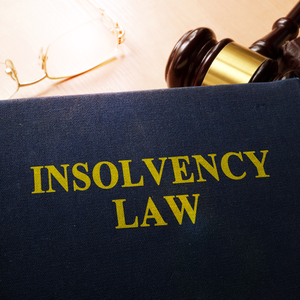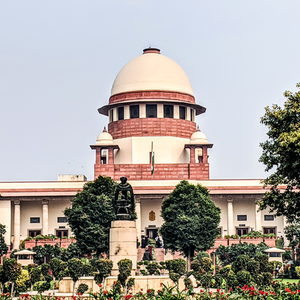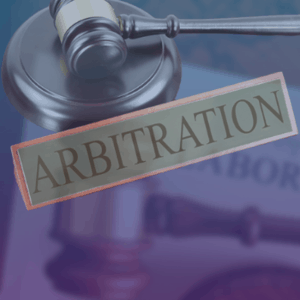Qualifications
B.Com., LL.B. (Constitutional Law Hons.), Institute of Law, Nirma University
Memberships
Bar Council of Delhi
About
Renjith is a partner in the dispute resolution practice group at Acuity Law. He specializes in dispute resolution and arbitration (domestic and foreign seated) and has advised and represented clients from diverse sectors such as aviation, logistics, manufacturing, healthcare, financial advisory, consulting, staffing as well as high net worth individuals. Renjith is regularly involved in representing clients in corporate, commercial, constitutional and regulatory disputes before various courts and tribunals including, the High Court of Bombay, National Company Law Tribunal, Securities Appellate Tribunal as well as ad-hoc and institutional arbitration tribunals.
- Representing and advising a Japanese logistics company on Indian law in a Singapore-seated arbitration and for enforcing the arbitral award in India.
- Representing and advising a non-resident Indian in an India seated international commercial arbitration proceedings against an Indian startup company.
- Representing and advising an Indian aviation company in seeking pre-award interim reliefs against an Australian aircraft leasing company.
- Representing and advising a Singaporean logistics company in pursuing its claim against an Indian company placed under insolvency and subsequently, liquidation under the Indian insolvency law.
- Representing and advising a Japanese international engineering consultancy services company in a shareholder’s dispute with an Indian shareholder.
- Representing and advising an Indian corporate shareholder of an Indian manufacturing company in shareholder’s dispute with fellow corporate shareholders.
- Representing and advising a Singaporean logistics company in a garnishee proceeding before an Indian court.
- Representing and advising an Indian security service provider company involving termination of services agreement.
- Representing and advising an investor against a prominent stock exchange before the Securities Appellate Tribunal.
Related Posts

July 28, 2023
Prove your innocence: Insights into the proposed securities trading regulations
Introduction Market manipulators have started adopting technology in order to illegally benefit from the securities market in India. The actions undertaken include using apps that encrypt communication, the use of mule accounts among other such measures that have a detrimental impact on capital markets. As a result of such modern methods being adopted, SEBI has…
Read more
August 1, 2023
What’s good for the goose is good for the gander – obligation of private parties to uphold fundamental rights
The Indian Constitution under Part III provides various fundamental rights which are sacrosanct and cardinal principles to achieve the core objectives of liberty, equality and dignity envisaged under the Indian Constitution. The rights under Part III create a corresponding obligation upon the State to ensure that the fundamental rights are not violated. In order to…
Read more
February 13, 2023
Arbitrability of disputes: A new face to the composite approach
In an international commercial arbitration, there are at least 5 (five) systems of law that have a material bearing on the procedure and outcome of an arbitration. These 5 (five) systems of law are (i) laws governing the contract; (ii) laws governing the arbitration agreement; (iii) laws governing the arbitral proceedings; (iv) laws governing the…
Read more
January 27, 2023
Avoidance application survives insolvency process
Introduction The Insolvency and Bankruptcy Code, 2016 (Code) contains four types of avoidable transactions that are to be avoided, otherwise it would affect the financial position of the corporate debtor - preferential, undervalued, defrauding creditors and extortionate transactions. The Code mandates that the Resolution Professional / the Liquidator (Insolvency Professional) should determine if the corporate debtor…
Read more
April 9, 2024
Compulsorily Convertible Debentures: Whether debt or equity?
Compulsorily Convertible Debentures (CCDs), a hybrid instrument, has gained prominence in the last two decades. However, its classification as equity or debt has been the subject of discussions, mainly due to conflicting perspectives under different laws. This initial divergence surfaced from the framework of guidelines under the Foreign Exchange Management Act, 1999 (FEMA), which deemed…
Read more
March 25, 2020
Dilution of Rights of Service Providers Under the Insolvency Law
In a recent judgment, i.e., on 17 January 2020, the Indian appellate insolvency tribunal, namely, the National Company Law Appellate Tribunal (NCLAT) held in M. Ravindranath Reddy v. G. Kishan, that the lease of immovable property cannot be considered as supply of goods or rendering any services and therefore the due amount cannot fall within…
Read more
December 12, 2022
New Development: Arbitrability of fraud allegations!
The adjudication of claims arising out of private civil or commercial arrangements between parties is ordinarily capable of being referred to arbitration. The underlying principle of arbitration remains that private arrangements between parties give rise to a right in personam (against a particular person), which is exercisable only between the parties to such an arrangement and…
Read more
August 29, 2022
Affixing Liability: Lifting the Corporate Veil Under Insolvency Law in India
Under corporate law, it is a well settled principle that a company has a juristic existence which is independent of its shareholders. An exception to this principle is the doctrine of lifting of corporate veil i.e., looking past the separate identity of the company and affixing liability on the actual perpetrators i.e., the management of…
Read more
February 20, 2020
15 Key Developments in IBC 2016 (in 2019)
In the winter of 2015, the Indian Legislature sought to tackle the persistent problem of bad debts affecting Indian financial institutions and trade creditors by enacting the Insolvency and Bankruptcy Code, 2016 (“Code”), which was finally notified in May 2016. The key purpose of the enactment was to consolidate and amend the laws relating to reorganization and…
Read more
July 14, 2022
Duomatic Principle and its application under the Indian company law
Very often, companies find it difficult to adhere to the various compliances especially related to shareholders meetings listed under the Companies Act, 2013. In such circumstances, it is useful to refer to the “Duomatic principle” under English Company law. The principle essentially allows the shareholders to bypass the formality of passing a resolution and states…
Read more
June 23, 2022
Supreme Court clarifies the rights of recovery certificate holders under the Insolvency and Bankruptcy Code
The Insolvency and Bankruptcy Code, 2016 (Code) was enacted to consolidate and amend the laws relating to reorganization and insolvency resolution of corporate persons. However, the overlap of the Code with the erstwhile laws relating to insolvency and recovery of debts, such as the Securitization and Reconstruction of Financial Assets and Enforcement of Security Interest…
Read more
October 27, 2021
Enforcement of Arbitral Awards and Decrees passed in the United States of America under Indian law
This article deals with our thoughts on some of the significant issues that may be faced if an arbitration award or decree passed by an arbitral tribunal or court within the territory of the United States of America (“U.S.”) is required to be enforced in India. Enforcing a U.S. arbitral award or decree can turn…
Read more
April 6, 2020
Foreign Seated Arbitration Between Indian Parties – A Legal Quandary
The choice of seat is one of the most important considerations for parties entering into an arbitration agreement. A mistake in choosing the wrong jurisdiction as the seat for the arbitration may take away the benefits which accrue to the party from a systematic arbitration mechanism. A number of parties prefer to conduct their arbitration…
Read more
April 10, 2020
Emergency Arbitration and Its Enforceability in Indian Context
Quite often, the chances of determining the success of enforcing a favorable decree depend on interim reliefs obtained by a party during the nascent stages of the proceedings. This is especially true for commercial litigation since obtaining the interim relief will ensure that the successful party is able to enforce the decree without expending any…
Read more
April 17, 2020
The Force Majeure Defence – Is it a Silver Bullet?
Economies and businesses across the world have been disrupted in the wake of the COVID-19 disease (COVID-19). The World Health Organisation (WHO) on 30 January 2020, in the second meeting of the Health Committee, constituted under the International Health Regulations 2005 (IHR), declared that the outbreak of COVID-19, constitutes a Public Health Emergency of International…
Read more
September 16, 2020
Arbitrability Of Lease Disputes in India: A Conundrum?
The past decade has seen a growth of dispute resolution through Arbitration in India making India a pro-arbitration center. The essence of the Arbitration and Conciliation Act (hereinafter ‘act’) is to provide an alternative redressal mechanism by reducing the intervention and burden on the courts in India. The act aims at minimizing the intervention of…
Read more
June 17, 2021
Consequences of an Unstamped Arbitration Agreement
The world over, contracts are the touchstone of commercial interaction. By entering into contracts, one assumes that each party will hold up their end of the bargain. However, the mere fact that there exist dispute resolution processes in all civilized countries for dealing with resolving commercial disputes, is indicative that in many situations misunderstandings arise…
Read more
April 19, 2024
Sale consideration deposited in Escrow Account – Event of Taxability
Corporate transactions and their related intricacies have always been a subject of frequent discussions in the corporate world. With changing commercials globally, there is an innovation in the commercial terms being agreed between the parties. With growing regulatory concerns and rise in tax claims with no certainty, a need arises to protect the interest of…
Read more
April 19, 2024
Sale consideration deposited in Escrow Account – Event of Taxability
Corporate transactions and their related intricacies have always been a subject of frequent discussions in the corporate world. With changing commercials globally, there is an innovation in the commercial terms being agreed between the parties. With growing regulatory concerns and rise in tax claims with no certainty, a need arises to protect the interest of…
Read more
April 9, 2024
Compulsorily Convertible Debentures: Whether debt or equity?
Compulsorily Convertible Debentures (CCDs), a hybrid instrument, has gained prominence in the last two decades. However, its classification as equity or debt has been the subject of discussions, mainly due to conflicting perspectives under different laws. This initial divergence surfaced from the framework of guidelines under the Foreign Exchange Management Act, 1999 (FEMA), which deemed…
Read more
April 8, 2024
Directors’ duties in India: Shareholders or Stakeholders?
The recent decision of Delaware’s Chancery court invalidating the grant of performance stock options to Elon Musk awarded by the board of directors of Tesla has reemphasized the nature of duties entrusted with directors. The directors of a company are its trustees and agents as they are responsible for ensuring the viable, successful, and sustainable…
Read more
April 2, 2024
No virtual service permanent establishment in India in the absence of a specific provision
The advent of the Digital economy has led to the introduction of various taxation issues. One such issue being creation of a virtual permanent establishment (PE) in a country, where the services are rendered without having any physical presence. The Income Tax Appellate Tribunal, Delhi (Tribunal), recently has dealt with the issue of creation of…
Read more
April 1, 2024
SEBI: Informal guidance from SEBI in respect of permissibility to make investments in the units of exchange traded fund for earning of regular income by the fund
The Securities and Exchange Board of India (SEBI) has issued an informal guidance under the Securities and Exchange Board of India (Informal Guidance) Scheme, 2003 (Informal Guidance Scheme) on whether a category III alternative investment fund (Cat III AIF) can make investments in the units of exchange traded fund (ETF) for earning regular income by…
Read more
March 23, 2024
Regulatory Update: SEBI amends REIT Regulations to address fractional ownership in real estate assets
The Securities and Exchange Board of India (SEBI) through SEBI (Real Estate Investment Trusts) (Amendment) Regulations, 2024 dated 08 March 2024 (Amendment Regulations) has amended the SEBI (Real Estate Investment Trusts) Regulations, 2014 (REIT Regulations) to address the issue of fractional ownership in real estate assets. The Amendment Regulations introduced a new chapter in the…
Read more
March 12, 2024
Withholding tax obligation on telecom companies – welcome relief by Hon’ble Supreme Court
Obligation (in the hands of telecom companies) to withhold taxes under Section 194H of the Income-tax Act, 1961 (IT Act) on discounts given to SIM card distributors has been a matter of long drawn dispute. Conflicting rulings have been pronounced by different High Courts and the issue has now attained finality by the judgment of…
Read more
March 1, 2024
Revision of CIRP Regulations to Streamline Corporate Insolvency Resolution Process
On 15 February 2024, the Insolvency and Bankruptcy Board of India (IBBI) notified the Insolvency and Bankruptcy Board of India (Insolvency Resolution Process for Corporate Persons) (Amendment) Regulations, 2024 (read here) to streamline the corporate insolvency resolution process (CIRP). A summary of the key amendments are as follows: These amendments, effective from 15 February 2024,…
Read more
March 1, 2024
Revision of CIRP Regulations to Streamline Corporate Insolvency Resolution Process
On 15 February 2024, the Insolvency and Bankruptcy Board of India (IBBI) notified the Insolvency and Bankruptcy Board of India (Insolvency Resolution Process for Corporate Persons) (Amendment) Regulations, 2024 (read here) to streamline the corporate insolvency resolution process (CIRP). A summary of the key amendments are as follows: These amendments, effective from 15 February 2024,…
Read more
February 29, 2024
Streamlining liquidation: Key changes to the liquidation regulations
On 12 February 2024, the Insolvency and Bankruptcy Board of India (IBBI) introduced the Insolvency and Bankruptcy Board of India (Liquidation Process) (Amendment) Regulations, 2024 (read here), aimed at enhancing the effectiveness and accountability of the liquidation process. A summary of the key amendments are as follows: These amendments, effective from 12 February 2024, are…
Read more